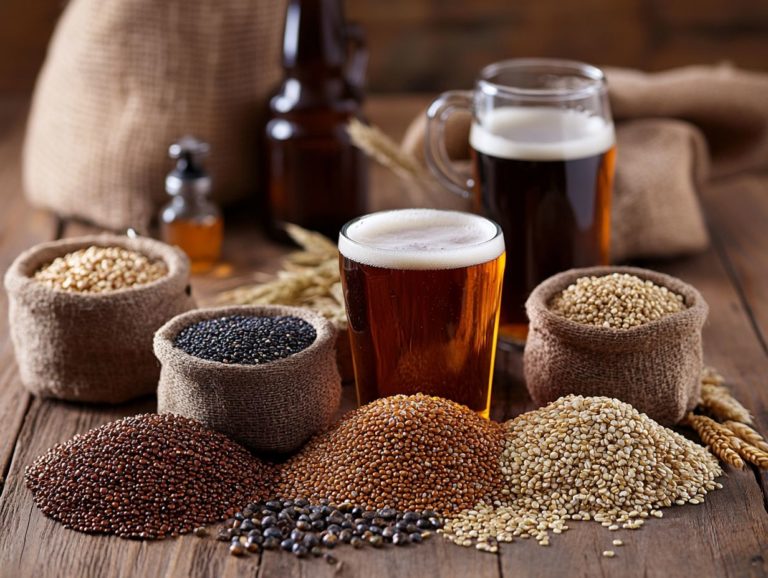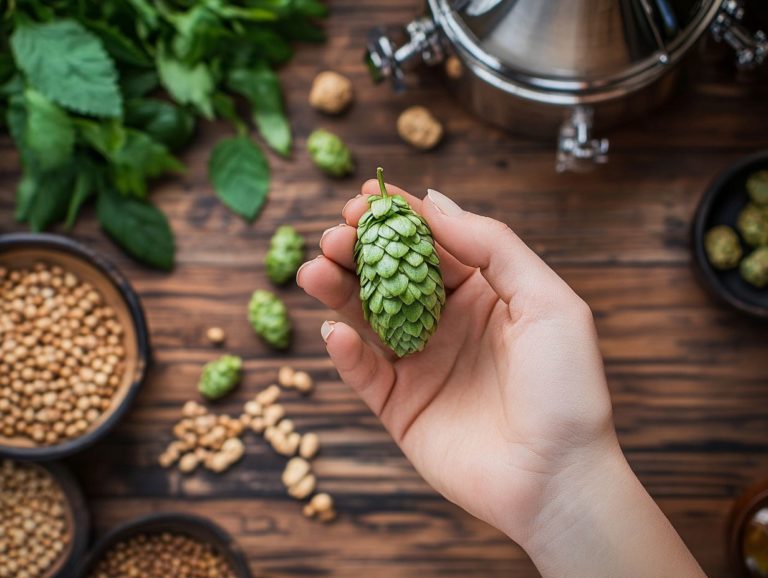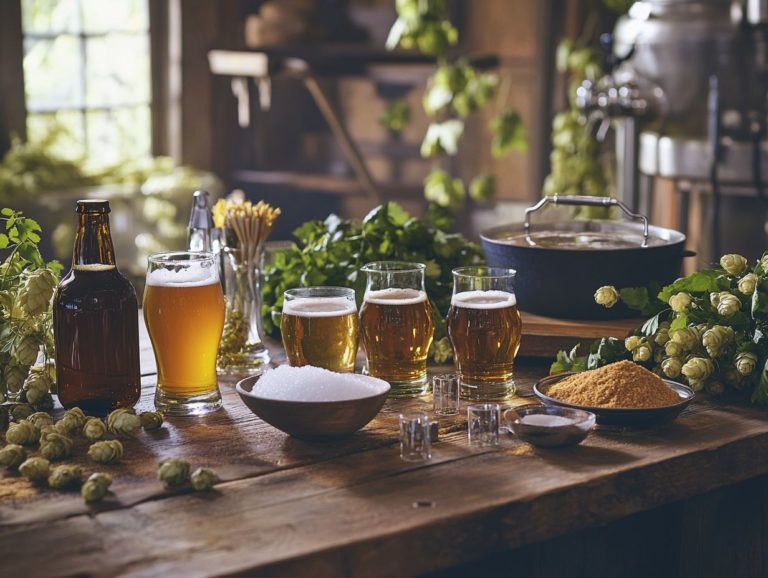Choosing the Right Water for Home Brewing
Water is the unsung hero of home brewing, often overlooked yet absolutely essential to the quality of your beer.
Join us as we dive into the type of water you use, along with its mineral content and chemical makeup, which can greatly influence the flavor, aroma, and mouthfeel of your brew. It’s crucial for you to explore your options. From tap water to distilled water, reverse osmosis (RO) water, filtered water, well water, rainwater, and bottled water, each source boasts unique characteristics that can either enhance or undermine your brewing efforts.
This guide delves into the various types of water, examining their effects on the brewing process and offering practical tips for selecting the best water for your next batch.
Embark on this journey with us as we uncover the vital role water plays in crafting the perfect brew.
Contents
- Key Takeaways:
- Why is Water Important in Home Brewing?
- What are the Different Types of Water Used in Home Brewing?
- How Does the Mineral Content of Water Affect Home Brewing?
- How to Choose the Right Water for Home Brewing?
- What are the Common Mistakes to Avoid in Water Selection for Home Brewing?
- Common Water Mistakes in Home Brewing
- Water Treatment: The Key to Perfect Homebrews
- How to Treat Water for Home Brewing?
- 1. Boiling the Water
- 2. Filtering the Water
- 3. Adding Minerals to the Water
- Frequently Asked Questions
- What is the importance of choosing the right water for home brewing?
- What factors should I consider when selecting water for home brewing?
- How can I test the pH level of my water for home brewing?
- What should I do if my water has high mineral content or needs adjustment?
- Can I use tap water or other water sources for home brewing?
- Are there any alternatives to using tap water or distilled water for home brewing?
Key Takeaways:
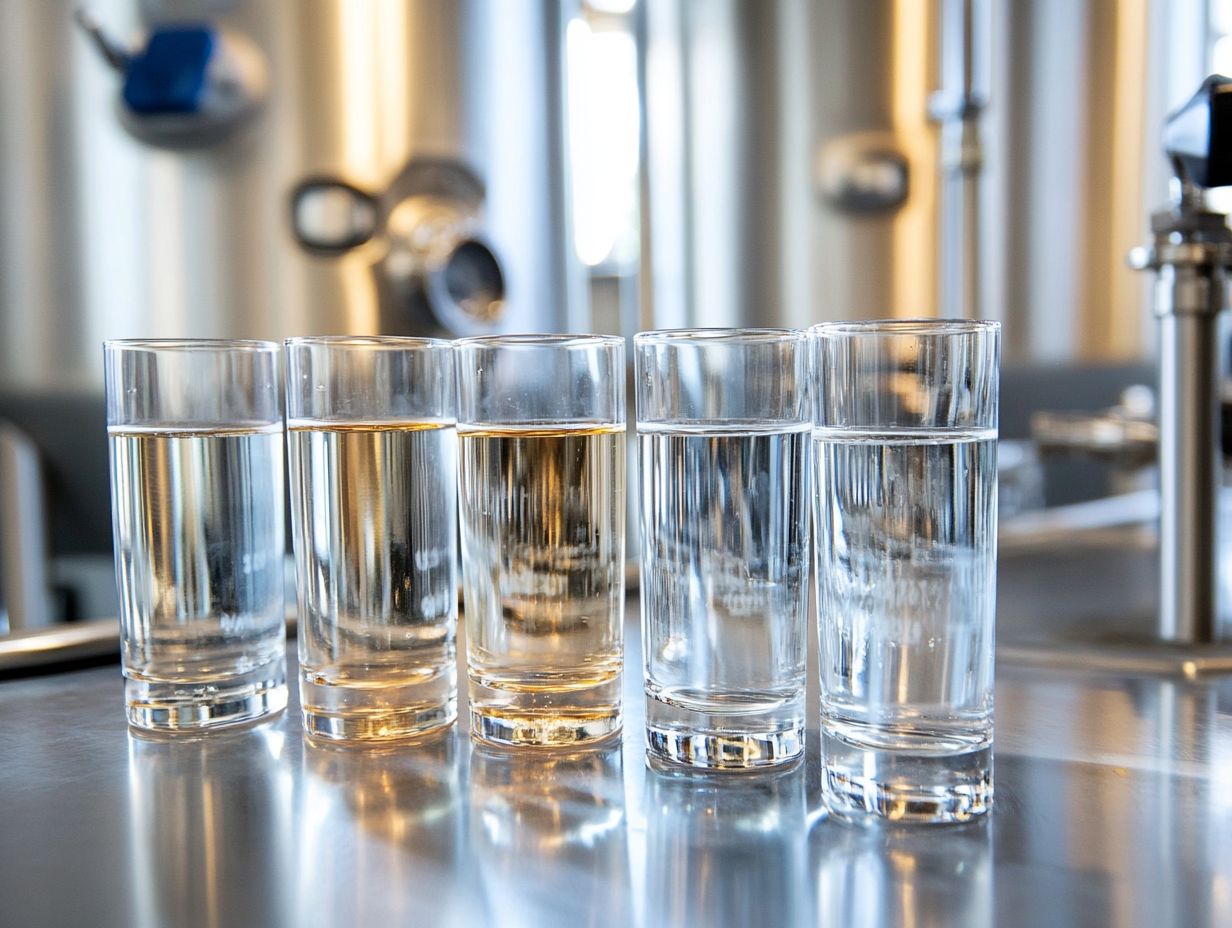
- Act now to choose the right water for home brewing based on the style of beer desired.
- Avoid common mistakes like using chlorinated water and failing to test water before brewing.
- Consider treating water through methods like boiling, filtering, or adding minerals to achieve the ideal mineral content for brewing.
Why is Water Important in Home Brewing?
Water serves as a critical foundation in home brewing, constituting about 90% of the final product. It’s not just about how much water you use; the mineral content and chemical composition of the water can greatly influence yeast growth, brewing techniques, and flavor profiles.
Gaining a nuanced understanding of the water you use its pH levels, mineral balance, and overall water profile is essential for creating high-quality beer that aligns with your unique taste preferences and brewing objectives. Therefore, choosing the right water isn’t just a procedural step; it’s a vital ingredient that can elevate or undermine your entire homebrew experience.
What are the Different Types of Water Used in Home Brewing?
As a home brewer, you have a remarkable array of water options at your fingertips, each boasting unique properties that can significantly impact both your brewing process and the final product.
The water you choose be it tap water, distilled water, reverse osmosis (RO) water (which is purified through a filtration process), filtered water, well water, rainwater, or bottled water can profoundly influence your beer s flavor, aroma, and mouthfeel. Each water source harbors different levels of minerals and impurities, making it imperative for you to thoughtfully consider how each type aligns with your recipes and the styles of beer you aim to create.
Grasping the advantages and disadvantages of each water type is essential for crafting that perfect homebrew you envision.
1. Tap Water
You may find that tap water is a popular choice among homebrewers, thanks to its accessibility and affordability. However, it often requires careful consideration and adjustments before you dive into the brewing process. Many municipal water supplies treat tap water with chlorine or chloramine, which can adversely affect the flavor profile of your beer and inhibit yeast growth.
It s crucial for you to test your tap water for chlorine and other chemicals, and take necessary measures for chlorine removal whether that means boiling the water or using Campden tablets before incorporating it into your brew.
Chlorine and chloramine can affect the flavor profile of your beer and inhibit yeast growth. The overall mineral content of tap water can vary widely, significantly impacting the final taste of your beer. You should pay close attention to key elements like hardness, alkalinity, and pH, as these factors shape the water profile that ultimately influences flavors, mouthfeel, and fermentation. Brewing software can be handy for monitoring and adjusting these factors.
Techniques such as reverse osmosis, using specialized water treatment kits, or employing brewing salts can help you customize your brewing water by adjusting mineral levels to align with the specific styles of beer you re producing.
By understanding and modifying your tap water, you can create a more balanced and flavorful brew while ensuring that the yeast performs optimally throughout the fermentation process. Using brewing salts like calcium chloride or calcium sulfate can aid in achieving the desired mineral content.
2. Spring Water: The Homebrewer’s Choice
Spring water is a top choice for homebrewers, celebrated for its natural mineral content and crisp flavor that can significantly enhance the quality of your brew. Sourced from underground springs, this water has a balanced mix of minerals that can beautifully complement various beer styles provided you re mindful of the specific mineral content and its potential effects on the final product.
By utilizing brewing salts to fine-tune the mineral profile of spring water, you can further optimize its compatibility with your desired beer style.
Choosing the right water can unlock exciting new flavors and aromas, elevating your drinking experience to new heights. For example, a higher calcium content might provide a fuller mouthfeel, while increased sulfate levels can lend a drier finish perfect for those hoppy IPAs.
As a homebrew enthusiast, you can experiment with different brewing salts, such as gypsum, calcium chloride, or magnesium sulfate, to customize the water chemistry according to your specific recipes. This level of personalization not only ensures that each brew aligns with your intended flavor profile but also transforms the art of brewing into an exhilarating journey of taste and tradition.
Try experimenting with different brewing salts and see how they transform your next batch!
3. Distilled Water: The Purity Factor
Distilled water stands out as a favored option for homebrewers who wish to eliminate all impurities and contaminants, offering a pristine foundation for crafting the perfect water profile. This type of water undergoes a meticulous distillation process that strips away minerals and chemicals, granting you precise control over your brewing process. However, the absence of mineral content in distilled water means you’ll need to add brewing salts like calcium chloride or magnesium sulfate to promote yeast growth and enhance flavor during fermentation.
One of the standout benefits of using distilled water is its remarkable purity, which results in a neutral taste that allows the intended flavors of your homebrew to shine through. This quality becomes particularly advantageous when you re brewing delicate styles where clarity of flavor is essential. When using distilled water, brewing salts and careful pH adjustments are necessary to create a balanced brew.
As a brewer, it s vital to pay close attention and make these adjustments to elevate your brewing game, as the lack of minerals like calcium and magnesium can potentially lead to fermentation challenges and a less vibrant final product. While distilled water provides an enticing blank canvas for brewing enthusiasts, it also places the responsibility on you to skillfully reintroduce the essential minerals that contribute not only to successful fermentation but also to the overall mouthfeel and complexity of your beverage. Utilizing brewing software can help in tracking these adjustments accurately.
Don’t hesitate to experiment with different brewing salts to find the perfect blend for your next brew!
4. Reverse Osmosis Water: The Clean Choice
Reverse Osmosis (RO) water is a stellar choice for homebrewers seeking high-quality brewing water that s free from most contaminants and unwanted minerals. This filtration method employs a filter to effectively remove impurities, ensuring the resulting water is exceptionally clean and pure.
While RO water lays a solid foundation for your brewing endeavors, you may find it necessary to adjust the water profile by reintroducing minerals. Utilizing brewing salts, such as calcium chloride and magnesium sulfate, allows you to achieve the desired flavor and balance in your beer.
Starting with such meticulously filtered water eliminates concerns about chlorine, sediments, and other variables that could compromise the quality of your final brew. However, it’s essential to note that the absence of minerals in RO water can lead to a bland taste if not properly adjusted. Thus, understanding water adjustment techniques and experimenting with various brewing salts becomes critical for creating unique and satisfying flavors. Brewing software can assist in making precise adjustments to achieve your desired water profile.
This thoughtful approach gives you the power to craft beers that not only distinguish themselves from one another but also resonate with regional characteristics, elevating your overall brewing experience. Dive into the world of RO water and see how it can elevate your brewing!
How Does the Mineral Content of Water Affect Home Brewing?
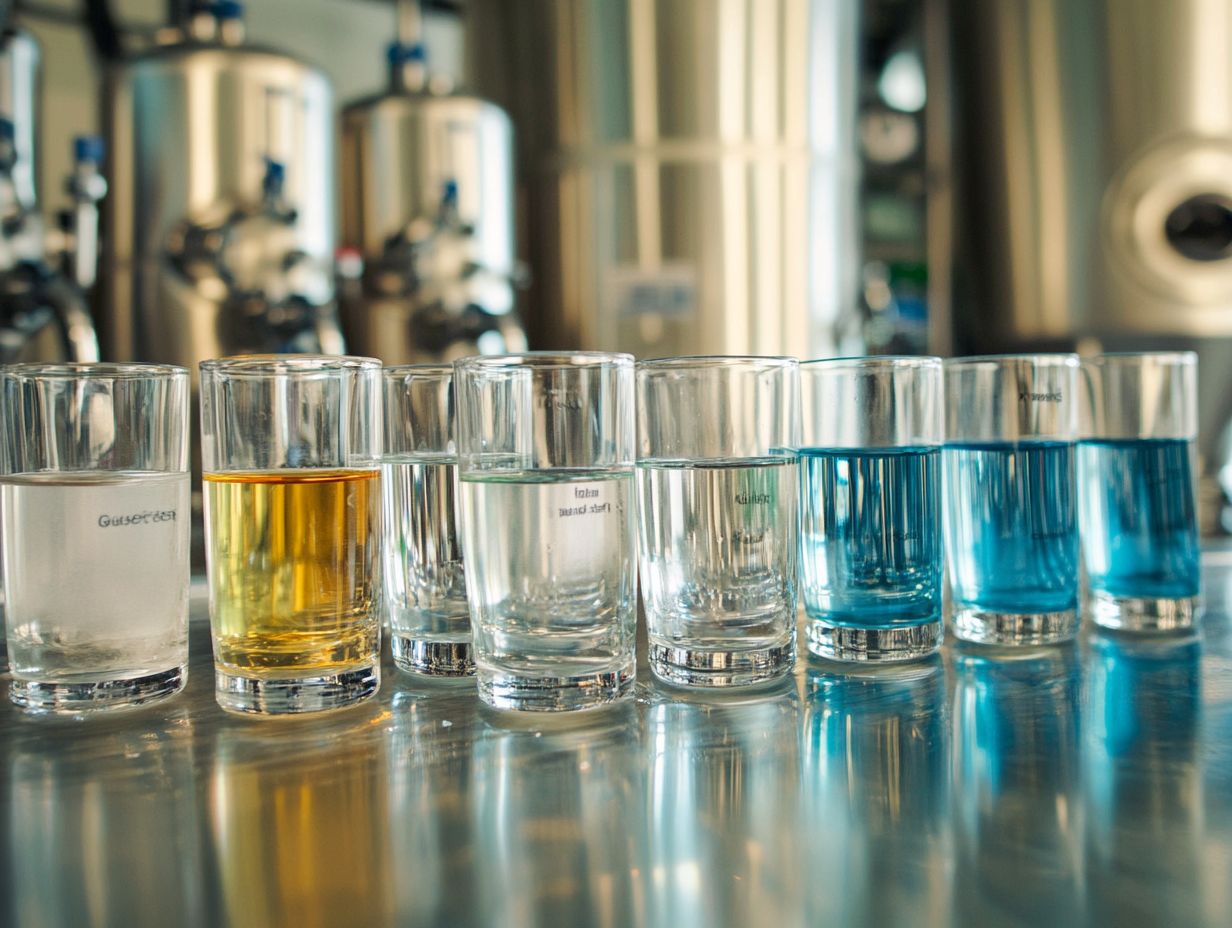
The mineral content of water is a pivotal element in home brewing. It shapes everything from yeast vitality to the flavor and mouthfeel of your finished beer.
Various minerals, including calcium, magnesium, and sulfate, each play distinct roles in the brewing process. They influence pH levels and allow you to refine your recipes for exceptional outcomes.
By grasping the art of adjusting the mineral content of your brewing water with specific brewing salts, you can craft a water profile that harmonizes beautifully with your selected beer style. This elevates your entire brewing experience to new heights. Using brewing software can help in making accurate pH adjustments and tracking water chemistry changes.
1. Hard Water vs. Soft Water
Hard water and soft water present distinct differences in mineral composition that can profoundly influence your brewing process and the final flavors of your beer.
Hard water, rich in minerals like calcium and magnesium, can boost yeast growth and enhance specific beer styles. In contrast, soft water typically has lower mineral content, offering a cleaner profile that may require some fine-tuning to achieve your desired brewing characteristics.
Understanding the nuances between hard and soft water is crucial for any home brewer looking to craft beers that truly reflect their unique styles.
The mineral content in hard water can elevate the overall mouthfeel and stability of your beer. This makes it particularly well-suited for robust ales and stouts that thrive on a fuller body. Soft water s lower mineral levels can produce a crisper, more refreshing brew, perfect for lighter styles such as lagers and wheat beers.
Using distilled water or RO water gives you greater control over the chemical makeup of your brew.
You should also pay close attention to pH levels and how they interact with yeast growth. Achieving the right balance can promote optimal fermentation, while neglecting this aspect can hinder yeast activity and lead to off-flavors.
Implementing proper pH adjustments and using specific brewing salts like calcium chloride and calcium sulfate can make a significant difference. Mastering the manipulation of these water types empowers you to refine your brewing techniques and elevate the profiles of your final beers.
2. The Role of Minerals in Brewing
Minerals are essential players in the brewing process. They influence everything from yeast growth to the delicate balance of flavors and mouthfeel in your final product.
Key minerals like calcium, magnesium, and sulfate significantly impact various aspects of brewing, including enzyme activity, fermentation efficiency, and the overall taste of your beer.
As a home brewer, you have the power to adjust the mineral content of your brewing water with specific brewing salts such as calcium chloride, magnesium sulfate, and calcium sulfate. This allows you to achieve the characteristics you desire and elevate the quality of your brew.
Mastering mineral adjustments opens the door to brewing excellence! Calcium not only supports yeast growth and enhances stability but also contributes to a richer mouthfeel. Magnesium bolsters yeast activity and fermentation processes, while sulfate emphasizes hop bitterness, leading to a more vibrant flavor profile.
With the addition of gypsum, Campden tablets, or Epsom salt, you can meticulously fine-tune your water chemistry. This crafting aligns perfectly with your taste visions.
Take charge of your mineral management today to transform your brewing experience and unleash your creativity!
In conclusion, understanding and adjusting the mineral content of your brewing water is essential for achieving the best results in your home brewing. By applying these insights, you can enhance your beer’s flavor and overall quality.
How to Choose the Right Water for Home Brewing?
Selecting the right water for home brewing is a critical decision that can significantly impact the quality of your final product. Whether you choose tap water, well water, or even rainwater, it requires careful consideration of several key factors.
Think about the style of beer you plan to brew, the mineral content of your water, and any necessary pH adjustments which means balancing the acidity or alkalinity of your water. Understanding the source of your water is essential, whether it’s bottled water, filtered water, or tap water.
Experimenting with different types of water allows you to tailor your brewing experience to your personal tastes and aspirations. Using brewing software can assist in achieving precise control over your water profile.
1. Consider the Style of Beer
The style of beer you intend to create is crucial when selecting water. Each beer type has specific water requirements that enhance its flavors and characteristics. For example, brewing a pale ale benefits from water with higher sulfate levels for a crisp finish, while a stout thrives on softer water that highlights its rich, malty flavor.
Understanding the mineral composition of water used for each beer style is key to achieving exceptional results. Lagers thrive on balanced mineral content for a clean taste, whereas IPAs might require a profile that accentuates hop bitterness. Pay attention to specific pH levels and hardness, as these factors greatly influence fermentation and the final taste of the beer.
By aligning your water profiles with your intended beer style, you can refine your brewing approach and elevate your craft, leading to a satisfying brewing experience.
2. Test the Water’s pH and Mineral Content
Testing your water’s pH and mineral content is an essential step in home brewing. A balanced pH level is crucial for yeast health and fermentation efficiency. Understanding your water’s mineral content helps you make adjustments that enhance flavor and overall brewing outcomes.
Start with a reliable pH meter or test strips to gain insights into your water’s acidity or alkalinity. Most homebrew retailers offer cost-effective testing kits to simplify the process. After determining the pH, examine the mineral content, focusing on levels of calcium, magnesium, sulfate, and chloride.
Each of these minerals plays a distinct role in brewing. Adjusting their levels ensures that your beer ferments beautifully and boasts a balanced flavor profile for an elevated drinking experience.
In conclusion, selecting the right water for home brewing is vital. Understanding your water’s characteristics and tailoring them to your brewing needs can lead to remarkable results. Start testing your water and embark on your brewing journey today!
3. Research the Water Source
Understanding the source of your water is crucial for brewing. Different sources contribute distinct mineral profiles that influence both the brewing process and beer quality. Whether you re using tap water, well water, rainwater, or bottled water, each has its own unique characteristics that can affect flavor and fermentation.
By diving into the composition of your chosen water source, you can make informed decisions and adjustments that will enhance your brewing techniques and help you achieve your desired outcomes. The mineral content in your selected water can significantly alter the brewing process. It impacts everything from pH levels to yeast performance.
For example, water from a deep well may contain higher levels of certain minerals like magnesium, enhancing flavors in specific beer styles. Conversely, tap water often needs filtration to reduce chlorine or chloramine, a chemical that can negatively impact beer flavor.
As a committed home brewer, taking the time to analyze your water source elevates your end product. It also opens the door for experimentation with various brewing techniques tailored to the specific qualities of your water. Understanding these differences gives you the power to refine your craft and produce exceptional beers that truly resonate with your personal taste.
Implementing chlorine removal techniques can further enhance the quality of your water.
4. Experiment with Different Water Types
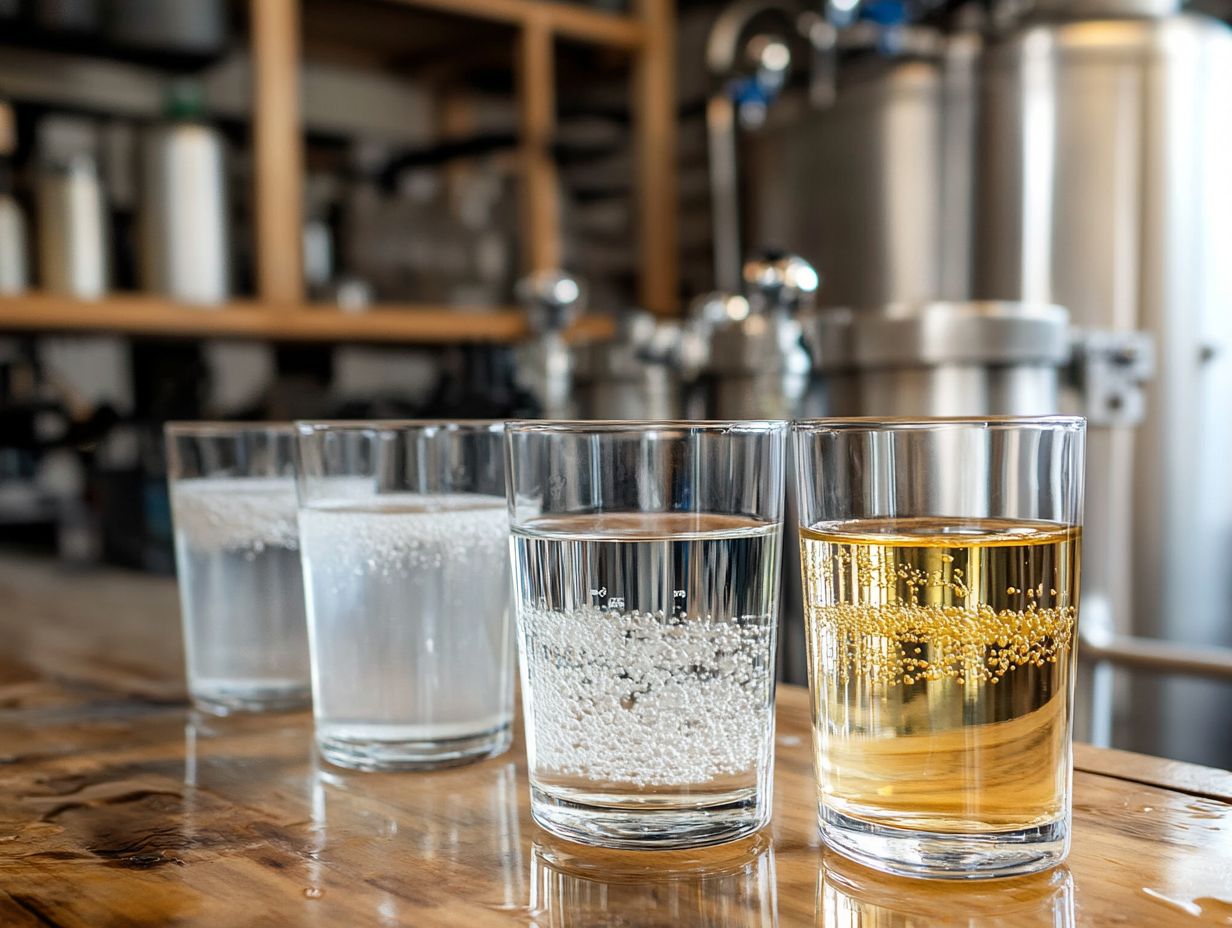
Experimenting with different water types is an exciting adventure in home brewing! It opens the door to discovering the unique flavors and characteristics that various waters impart on your beer. By testing sources like filtered water, RO water, and spring water, you gain valuable insights into how each type influences both your brewing techniques and the final quality of your product.
Whether you use brewing water that’s distilled water or rainwater, carefully adjusting your water profile allows you to customize your brewing process to achieve the optimal flavor and balance in your creations. Each water type presents its own mineral content, pH levels, and other characteristics that can significantly impact the brewing process.
For example, hard water, rich in minerals like calcium and magnesium, can enhance the boldness of hoppy beers, while soft water can create a smoother profile for lighter ales. Incorporating malt extract can also adapt some water profiles to your needs.
Venturing into different water sources reveals the importance of mineral content. It also highlights how subtle adjustments in water chemistry can transform your brewing techniques and elevate the taste of your beer. Utilizing brewing software and engaging in this kind of experimentation encourages you to refine your methods and discover the ideal water solution that brings out the best in your favorite recipes. Don’t miss out on the chance to elevate your brewing game!
What are the Common Mistakes to Avoid in Water Selection for Home Brewing?
Choosing the right water for home brewing is paramount. Yet, many enthusiasts stumble into common pitfalls that undermine their brewing success and compromise the quality of their beer.
These missteps often arise from neglecting critical elements of water selection. Common oversights include not testing for chlorine and other impurities, overlooking the specific mineral requirements of your chosen beer style, and failing to adjust the water profile to align with your brewing techniques.
By recognizing these frequent errors, you can make informed choices that enhance your brewing journey. This ultimately leads to a more enjoyable and gratifying experience.
Common Water Mistakes in Home Brewing
1. Using Chlorinated Water
One of the most significant missteps you can make in water selection for home brewing is using chlorinated water without proper treatment. Whether it’s tap water or another source, chlorine can severely compromise the flavor and aroma of your beer. This can ruin the flavors you worked hard to create, leading to off-flavors that are far from desirable in your final product.
This oversight can also negatively impact yeast growth during fermentation. As a result, you could end up with a brew that just doesn’t meet your expectations. To avoid this pitfall, consider methods such as boiling the water or using Campden tablets for effective chlorine removal. These small steps ensure that your brewing techniques yield the best possible results.
Understanding the implications of chlorinated water is crucial as you embark on your homebrewing journey. The presence of chlorine can mask the delicate nuances of your selected ingredients, from malt to hops. The health of your yeast is also affected; chlorine creates an inhospitable environment that leads to sluggish fermentation or even stalled brews.
By incorporating solutions such as activated carbon filters or employing reverse osmosis systems, you can create a cleaner, more controlled water profile. Careful water adjustments not only enhance your brewing process but also contribute to producing a superior final product resulting in a beer that truly reflects your skill and intentions as a brewer.
2. Not Testing the Water Before Brewing
Neglecting to test your water before brewing is a big mistake that can introduce unexpected issues into your brewing process. This oversight can ultimately compromise the quality of your beer. By conducting proper water testing, you can assess the mineral content and pH levels. These insights will inform the necessary adjustments to ensure that your chosen water promotes yeast growth and enhances flavor.
Investing time in water analysis allows you to sidestep complications and produce a consistent, high-quality product. Understanding the specific mineral content in your brewing water is paramount, as elements like calcium, magnesium, and sulfate play vital roles in flavor development and overall mouthfeel.
Different beer styles may demand unique mineral balances, making it essential to customize the water to fit your recipe. You can explore various testing options, including test strips, kits, or even professional lab analyses. These options enable you to accurately evaluate your water quality.
These insights not only help you correct any deficiencies but also elevate the character of your brew, ensuring a more enjoyable drinking experience for everyone involved.
3. Using Water with High Mineral Content
Using water with excessively high mineral content can create quite the conundrum for you as a home brewer. This can lead to poor flavors and hinder yeast growth during fermentation. While certain minerals can be beneficial in moderation, an overload can throw off the delicate balance needed for brewing perfection.
By taking the time to understand the mineral content of your water and making the necessary adjustments with brewing salts, you can craft a more suitable water profile that supports a diverse range of beer styles. The consequences of brewing with high mineral content can be pronounced, potentially leading to off-flavors or even a beer that refuses to ferment correctly.
You may find yourself grappling with overly bitter or metallic tastes, often the result of excess calcium or magnesium levels. To steer clear of these pitfalls, it’s vital to test your water before diving into the brewing process and to consider making tweaks with the right brewing salts.
Careful water adjustments not only enhance specific flavors but also minimize adverse effects, ultimately resulting in a more balanced and enjoyable final product. Mastering this equilibrium is essential for any home brewer who aspires to create high-quality brews.
Water Treatment: The Key to Perfect Homebrews
Crafting the perfect homebrew starts with one essential element: the water. Imagine savoring a brew that perfectly showcases your favorite flavors! Properly treating your water is vital to meet the specific requirements necessary for successful fermentation and achieving optimal beer quality.
4. Not Considering the Beer Style
Neglecting to consider the specific beer style when selecting water can lead to disappointing outcomes and less than optimal brewing results. Each beer style has distinct requirements regarding water composition, and overlooking these can create a mismatch that detracts from the intended flavor and aroma.
By aligning your water selection and adjustments with the characteristics of your chosen beer style, you can elevate your brewing techniques and achieve the quality you desire in your homebrew.
For instance, pale ales often thrive with slightly softer water, which helps to accentuate those vibrant hop flavors. In contrast, stouts might benefit from a higher mineral content that enhances their roasted characteristics.
The chemistry of water its mineral content and pH can dramatically influence the final product, affecting everything from mouthfeel to bitterness. Many homebrewers tend to overlook this crucial aspect. However, taking the time to adjust water profiles not only enhances taste but also embodies a significant facet of brewing craftsmanship.
Therefore, understanding the relationship between water and beer style is essential for your success in crafting memorable homebrews.
How to Treat Water for Home Brewing?
You can employ various methods for water treatment, such as:
- Boiling to eliminate contaminants,
- Filtering to remove impurities,
- Adding brewing salts to balance the mineral content.
These techniques allow you to customize your water profile, enhancing yeast performance and ultimately elevating the overall flavor of your beer.
1. Boiling the Water

Boiling water stands out as one of the simplest yet most effective methods for treating water in home brewing. It effectively eliminates chlorine and other harmful contaminants, improving the overall quality of your water for yeast growth and enhancing your brewing success.
By taking the time to boil your water before brewing, you ensure that what you re using is as clean as possible. The act of boiling doesn t just crank up the water temperature to a level that kills off many microorganisms; it also facilitates the evaporation of volatile compounds that could interfere with your brewing process.
As a homebrewer, you ll discover that boiling your water for at least a minute can dramatically reduce levels of chlorine and chloramines, a chemical that can affect the taste of water, giving your final product a cleaner taste and aroma.
Boiling also helps remove harmful contaminants like heavy metals and sediment, which could adversely affect the flavor profile of your brew. It s a straightforward step that brings substantial benefits, fostering a more favorable environment for yeast fermentation and ultimately leading to a more successful batch.
2. Filtering the Water
Filtering water is a fundamental step in your home brewing journey, as it effectively eliminates impurities and enhances the overall quality of your brewing water.
For those of you committed to perfecting your brew, grasping the various methods of water treatment is essential. Activated carbon filters excel at removing chlorine and other organic compounds that can significantly impact the taste of your final product.
On the other hand, reverse osmosis systems offer a comprehensive solution by filtering out a wide array of contaminants, including heavy metals and microbiological impurities.
Consider sediment filters as well; they capture larger particles, ensuring a cleaner input for your water treatment process. Each of these filtering techniques is crucial, enabling you to customize your water profiles and achieve the specific characteristics you desire in your homebrew.
Now that you have learned how to treat your water, don’t hesitate to experiment with different methods. Share your results and continue perfecting your brewing craft!
3. Adding Minerals to the Water
Adding minerals to the water you use in home brewing is a game changer that allows you to tailor the water profile to suit specific beer styles and enhance flavor characteristics. Use brewing salts like calcium chloride, calcium sulfate, and magnesium sulfate to change your water s mineral content. This practice optimizes yeast health and overall brewing success, improving fermentation and contributing to the final beer’s aroma, mouthfeel, and taste.
Adjusting mineral levels can significantly influence your brewing process and the overall quality of your beer. For instance, calcium chloride can promote sweetness and fullness in your finished brew, making it perfect for styles like stouts and porters. Calcium sulfate works well for hoppier ales, providing a crisp and dry finish that can elevate your creations. Additionally, magnesium sulfate boosts yeast performance during fermentation.
Understanding how these minerals work together is essential for you as a home brewer aiming to craft a well-rounded, flavorful beer that truly stands out in a crowded market.
Frequently Asked Questions
What is the importance of choosing the right water for home brewing?
Choosing the right water is a game changer for your brew! Water makes up a large percentage of the final product, so it can greatly affect the taste and overall success of your brew.
What factors should I consider when selecting water for home brewing?
The main factors to consider are:
- pH level
- Mineral content
- Chlorine/chloramine levels
These can all have a significant impact on the flavor and fermentation of your beer.
How can I test the pH level of my water for home brewing?
You can purchase a pH testing kit specifically designed for testing water used in brewing. Alternatively, send a sample of your water to a lab for professional testing.
What should I do if my water has high mineral content or needs adjustment?
If your brewing water has high levels of minerals like calcium and magnesium, dilute it with distilled water or treat it with a water softener. You can also use RO water, which is reverse osmosis water, for this purpose. Proper water adjustment will prevent off-flavors and ensure a smoother fermentation process, supporting optimal yeast growth.
Can I use tap water or other water sources for home brewing?
It is generally not recommended to use tap water for home brewing, as it often contains chlorine or chloramine that can negatively impact the flavor of your beer. However, if your tap water is free from these chemicals such as after chlorine removal using Campden tablets it can be used with proper testing and adjustments. Consider using brewing software to manage your water profile and chemical makeup for the best results.
Are there any alternatives to using tap water or distilled water for home brewing?
Yes, you can use bottled water, such as bottled spring water, or filtered water as an alternative to tap water. Well water and rainwater are also options if properly tested. Nonetheless, it is important to test and adjust the water as needed to ensure the best results for your specific beer recipe. You might also consider using brewing techniques such as adding brewing salts like calcium chloride, calcium sulfate, and magnesium sulfate or making pH adjustments to fine-tune your water profile.


